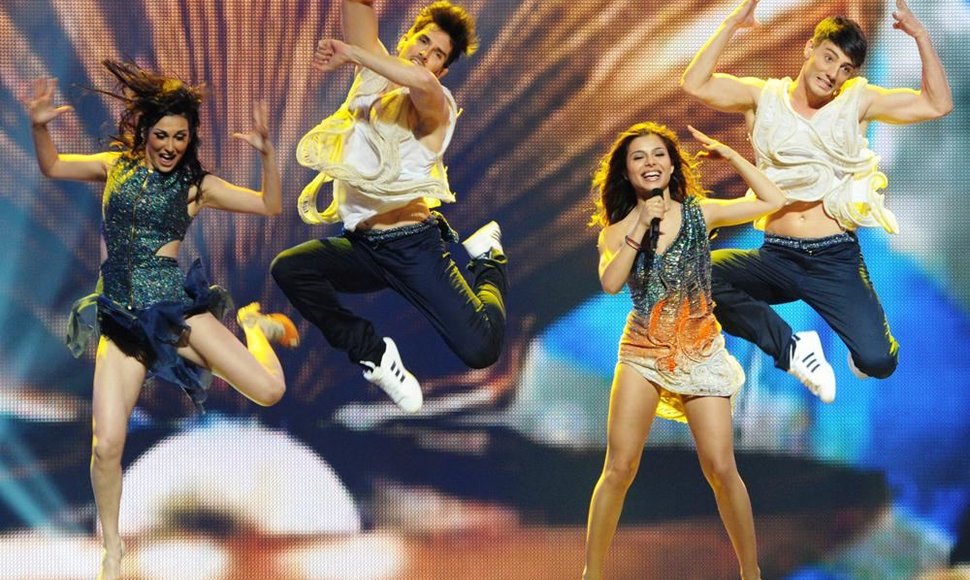None of these less-than-serious promises have materialized. And while one could not in all fairness blame sports failures on politicians, it is true that a country's success in the Eurovision Song Contest largely depends on its foreign policies. This year, Lithuania received fewer points from its closest neighbours than ever before; Lithuanian expats' affections to their motherland, too, seem to be on the wane.
Winning is within our grasp
British sociologist Derek Gatherer carried out a study in 2006 on political voting in Eurovision and grouped all participating countries into five blocks of “mutual support.”
Lithuania got assigned into the second-largest “Viking Empire” group together with Latvia, Estonia, Finland, Sweden, Norway, Denmark, and Iceland. Another big block comprised the Balkan countries: Greece, Cyprus, Romania, Hungary, Bosnia and Herzegovina, Croatia, Serbia, etc.
The scientist concluded that it was countries belonging to one of these two blocks that stood the best chance of winning Eurovision.
Well, one could disagree. It is less than certain that Lithuania gets the Scandinavian vote – its belonging to the “Viking Empire” seems rather shaky. In fact, Lithuania is probably drifting between the Vikings and the “Warsaw Pact” block which includes Russia, Poland, and Ukraine that do indeed generously support each other.
If that were true – and Gatherer's divides withstood scrutiny – it would mean that Lithuania is rather well-positioned for Eurovision victory. Why then not a single Lithuanian representative has ever made it into the top five?
 |
| „Scanpix“ nuotr./Donatas Montvydas of Lithuania |
2006: the emigrant vote
If one suspended considerations of the quality of Lithuania's Eurovision entries, it could be said that 2006 was the golden year. 30 nations then gave points to Lithuania. Sure, the country secured such backing by sending a good song, thinks music expert Darius Užkuraitis, whose off-screen voice comments Eurovision broadcasts on Lithuanian national television every year.
But there were undoubtedly more factors at work. Having joined the European Union in 2004, Lithuania had just experienced a huge wave of emigration. Highest score from Ireland, ten points from the UK, some from Spain and Norway. It is very likely that it wasn't just local nationals of these countries who voted for Lithuania, but also Eastern European newcomers. Not necessarily only Lithuanians, but also Latvians, Poles, Estonians that stuck together abroad.
Several years later, the expat support had eased somewhat. As early as 2009, none of the above-mentioned countries gave Lithuania's entry douze points. Last year, Lithuanian representative Evelina Sašenko and her Polish ancestry drew some attention from migrant Poles, while this year, the biggest Lithuanian “emigrant islands” – Ireland and the UK – gave Donatas Montvydas only 7 points each.
Triumph of neighbourhood
It used to be customary that “brother Latvians” supported Lithuania with highest scores, but this year their support was less than brotherly (4 points). Instead, Belorussians were more generous (8 points), even though they usually look East for good music. Music expert Darius Užkuraitis says politics could be involved in this.
“We are always at odds with everyone. That probably, too, has an impact,” he notes.
Arnoldas Lukošius, who went to Eurovision in 2006, can also see politics behind the song contest results. He once said that in order for Lithuania to win, it should give up political intrigues and avoid negative reactions.
It is politics rather than similar tastes in music that explains Georgia's support to Lithuania (12 points this and last year), Užkuraitis thinks.
“It was the second time we received 12 points from Georgia – and that is undoubtedly the legacy of Valdas Adamkus' Eastern policies. Let's wait and see how much longer it will last,” the music expert speculates.
Zero investment into image
15min.lt contacted several political scientists, who refused to speculate on reflections of Lithuanian foreign policy in Eurovision successes and failures. “We are not commenting on balalaikas,” they all said when confronted with questions on Eurovision. Meanwhile Užkuraitis, who always follows the contest, says it is wrong to look at Eurovision as merely another commercial show.
“For the Foreign Ministry, Eurovision is nothing more than a pop music show and not a tool for boosting the country's image. How much funding does it get? Zero. Why is that? We think that a representative in Eurovision is a country's flag-bearer, but the official opinion disagrees,” Užkuraitis deplores the lack of state support for Lithuania's Eurovision bids.
“I think that if we look at the ratio of investment made to position won, then we can say that we did quite well. Albania alone could probably rival us in how little money it spent,” Užkuraitis notes.
Music is important too
He says that there are other factors besides politics and finance that determines one's position in the final table. According to Užkuraitis, not even one's neighbours vote for a hopeless song, while an excellent one receives support from people who hardly know anything about Lithuania.
“We received many points from unexpected countries this year. I'm very surprised that the French voted for us – something they never did before. We must have truly hit right into the European taste,” the Eurovision expert notes.
Besides, he says, even if one sees Eurovision as a political affair where everyone votes for their own pack, one mustn't forget that it is not only solidarity that neighbouring countries share but also similar tastes in music.
“Why should the Balkan nations vote for Sweden or Lithuania, whose music sounds so alien, while they all used to live in one state and grew up listening to the same performers?” Užkuraitis asks.
 |
| BFL nuotr./LT United has so far done best in Eurovision - 6th place in 2006. |













